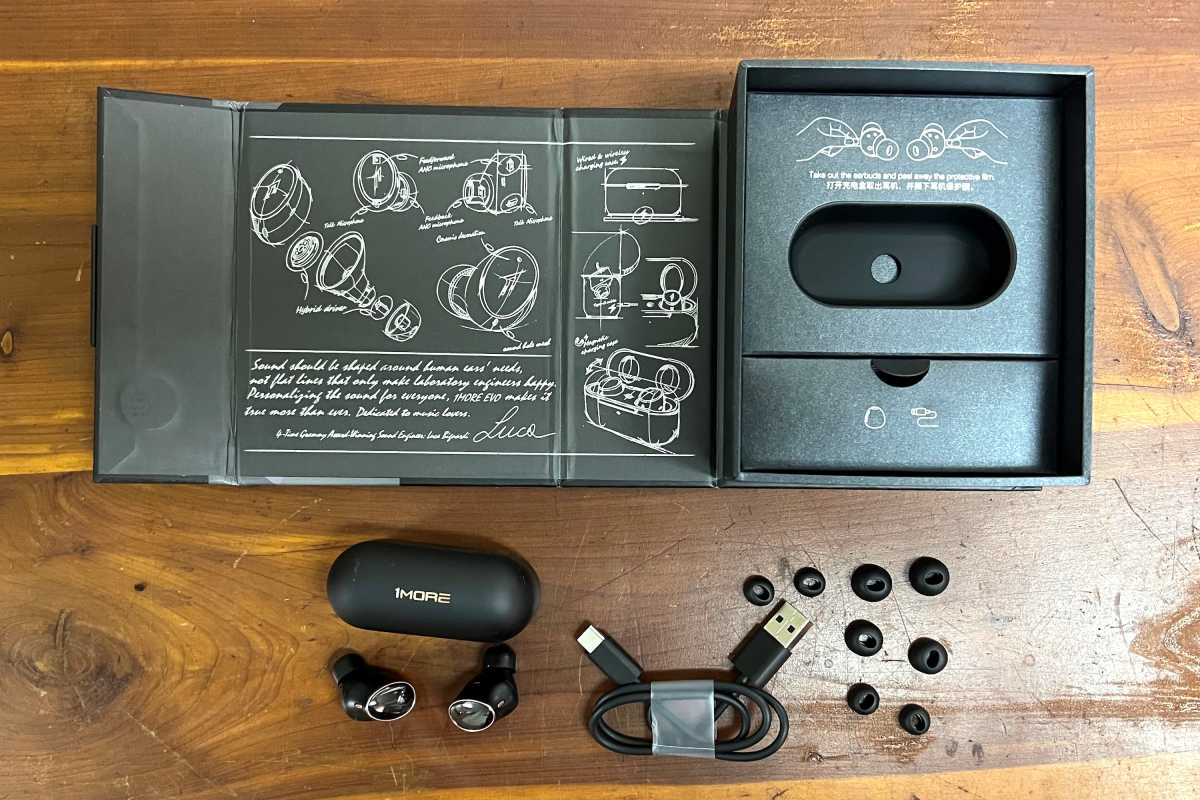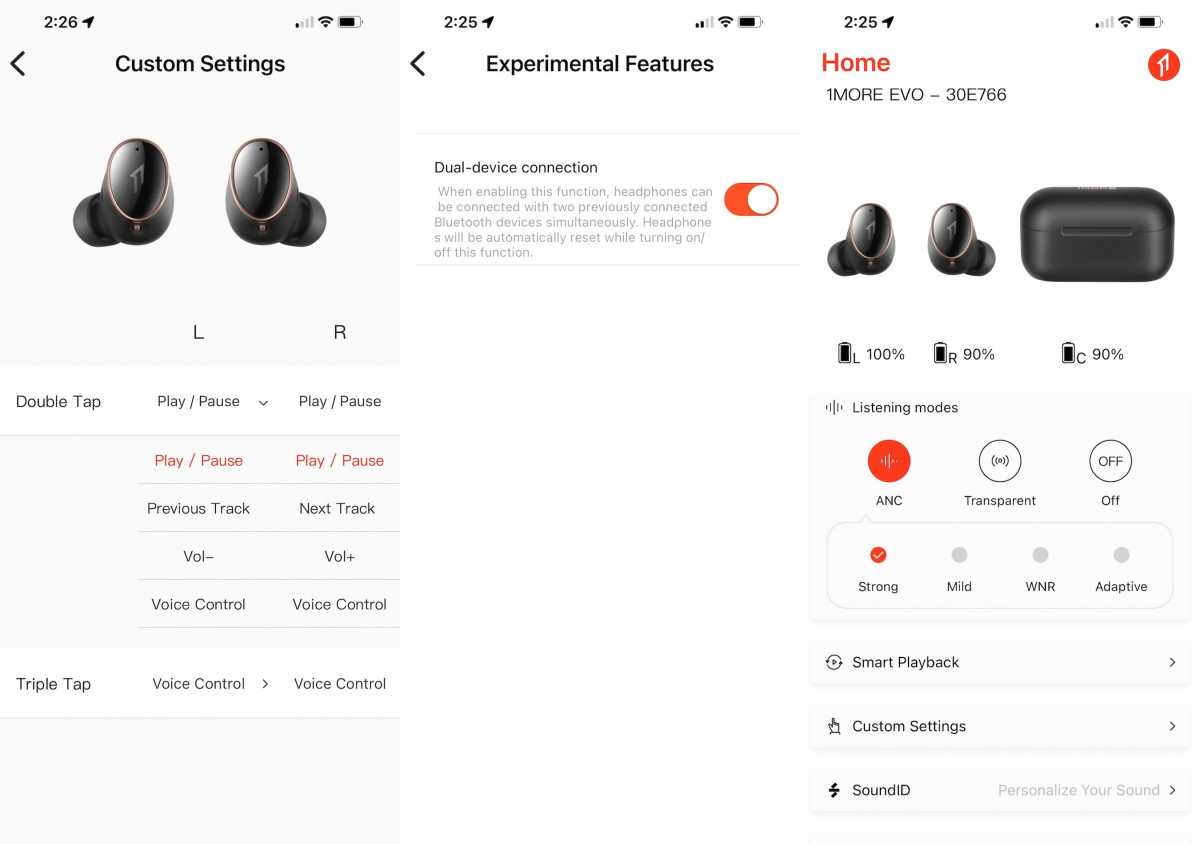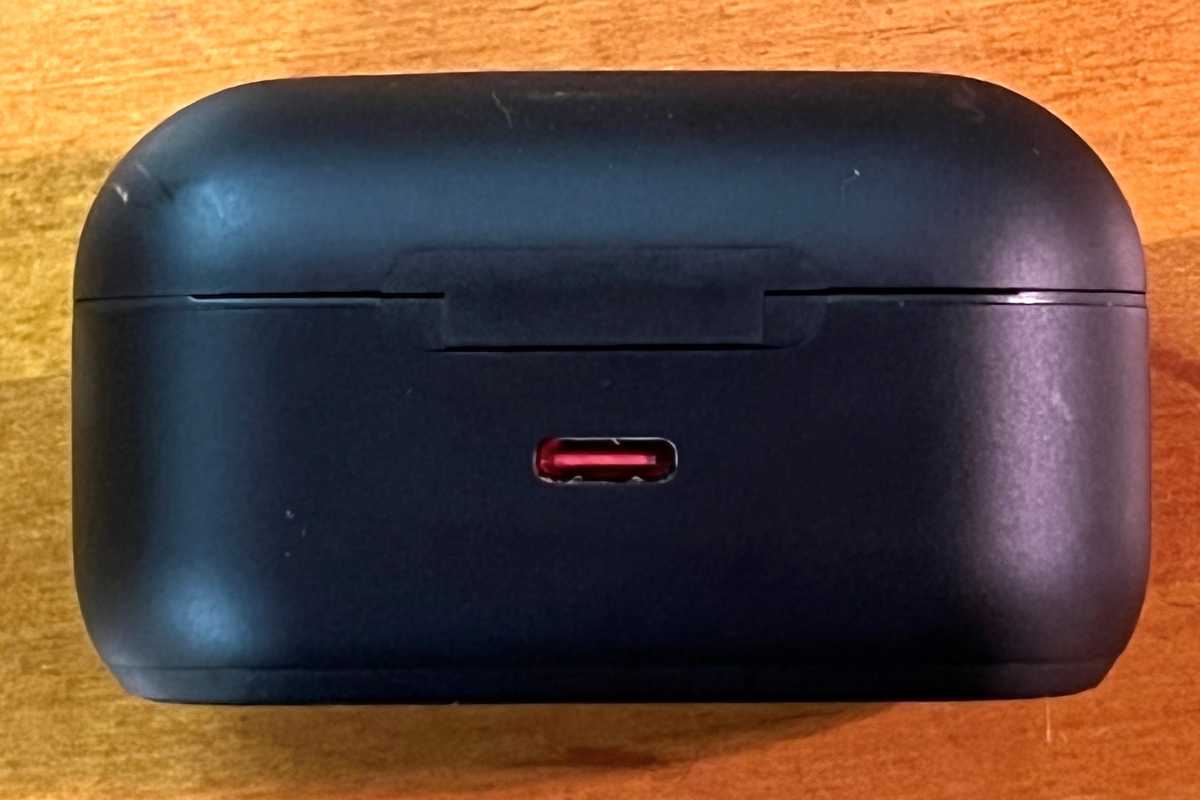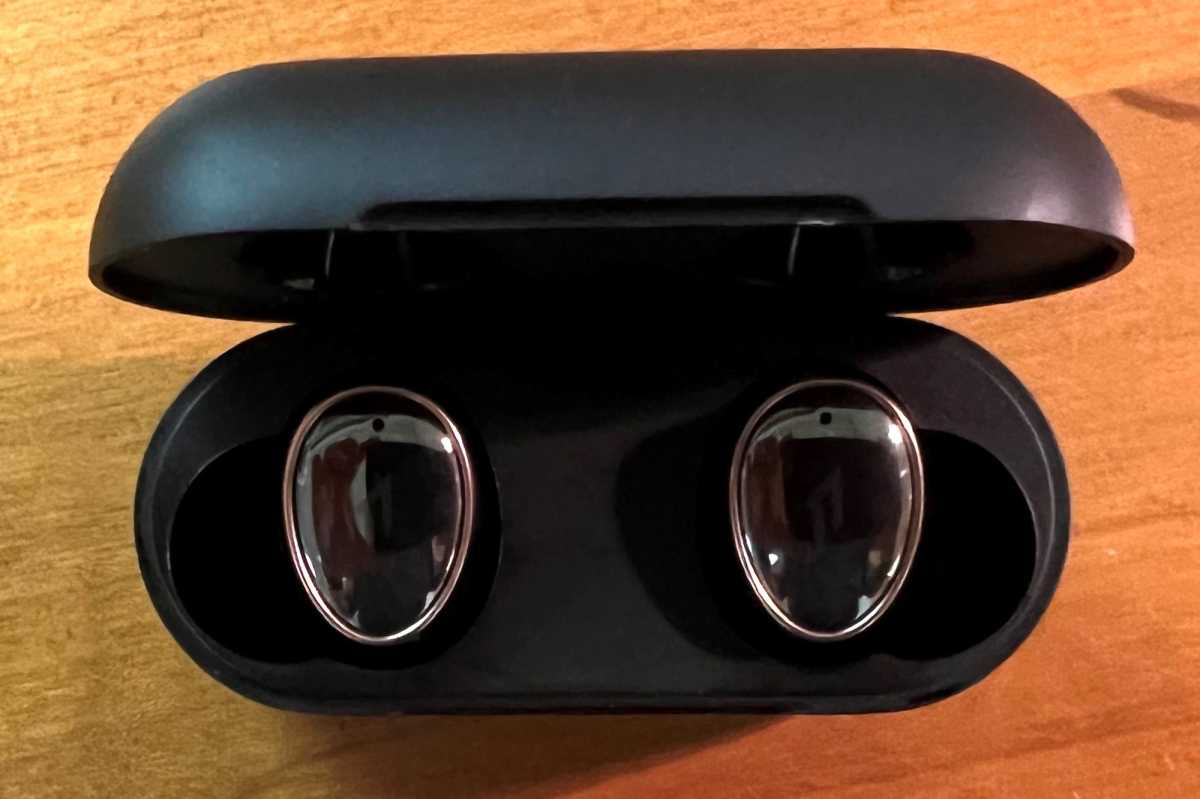Expert’s Rating
Pros
- Elegant and solid build
- Effective active noise cancellation
- Outstanding audio reproduction, with LDAC support for hi-res audio
- Comfortable for long-term wear
Cons
- No aptX support
- EQ tweaks are limited
- Touch controls can be easily changed, but only support two functions at a time
Our Verdict
The 1More Evo earbuds are stylish, well-built, and have a remarkably neutral sound profile. Your custom EQ options, however, are limited to a profile generated by the 1More app’s SoundID test.
1More might not have the same recognition as Sony, Bose, or Apple, but the company’s headphones have earned consistently good reviews and more than a few “best of” recommendations over the past few years. The Evo true wireless noise-cancelling earbuds are their new top-of-the line model, and they seem destined to continue the company’s string of successes.
You get excellent audio quality and a metal charging case that gives the Evo headphones a premium feel. The active noise cancellation is a bit more relaxed than what you’ll find in many of the other top-rated brands, but that lower intensity makes for a better listening experience when ANC is engaged.
Note: 1More is having a back-to-school sale through July 26, during which the 1More Evo are selling for $135.99, with a free Qi wireless charging pad.
1More Evo build quality
The Evo are available in either black or white. The charging case is made of aluminum, and that design choice gives the headphones a premium feel that plastic cases cannot match. The earbuds themselves are plastic for weight reasons, but the gold band surrounding the shiny face of each earbud makes them look like a pair of particularly elegant cufflinks or earrings.
There are five sizes of eartips (XS, S, M, L, XL) to give users more chances for a proper fit. You also get a USB-A-to-USB-C charging cable in the box.
This review is part of TechHive’s coverage of the best noise-cancelling headphones, where you’ll find reviews of the competition’s offerings, plus a buyer’s guide to the features you should consider when shopping for this type of product.

Five different sizes of ear tips mean give 1More Evo headphones users a better shot at finding the perfect fit.
James Barber/Foundry
These earbuds connect via Bluetooth 5.2 and support the Sony LDAC, AAC, and SBC codecs, but not AptX. LDAC support is becoming increasingly common on modern Android devices, as well as Sony’s Walkman and Xperia product families. That LDAC support allows 1More to market the Evo as a Hi-Res wireless audio device.
Each earbud has both a 10mm dynamic driver and a balanced armature drive for a frequency range of 20Hz to 40kHz.
1More has enabled multi-point connection on the Evo earbuds, which allows you to connect the headphones to two Bluetooth sources at the same time. That’s incredibly useful if you stream music from a computer or digital audio player and need to take calls on your phone during a workday. You’ll need to dig deep into the app to access the controls: Tap the 1More logo at the top right of the app screen and select Experimental Features to access the dual-device connection switch.
Using the 1More Music app

The 1More app allows you to change the functions supported by each Evo earbud’s touch control, but you’re limited as to how many of those functions can be active at one time. The app also lets you set up dual-device connection and tweak the ANC settings.
James Barber/Foundry
The 1More Music app offers access to firmware updates, controls settings, and tweaks to the Evo’s sound profile. Aside from displaying exact battery levels for each earbud and the case, the app’s most important function is ANC control. ANC is off by default and, while you can switch between Off, ANC, and Transparent settings with a long press on the earbud touch controls, you must use the app interface to choose between the Strong, Mild, and Wind Noise Reduction ANC settings.
1More doesn’t use voice prompts when switching between ANC, Transparent, and Off modes, but each setting gets a distinct tone that plays when you long-press the earbud. Once you switch between settings a few times with the app open, it’s not hard to remember which sound goes with which setting.
If you get a good seal with the ear tips, the Evo headphones have a remarkable good amount of passive noise reduction.

A USB-C port on the back of the 1More Evo earbuds case allows for wired charging, but wireless charging is just as fast and a full charge takes just an hour.
James Barber/Foundry
Out of the box, a double tap on either earbud controls pause and play for listening, and answers or hangs up a phone. If you want the ability to skip or go back a track or control volume via the touch controls, the Custom Settings pane allows you to assign different actions to each ear for a double or triple tap beyond the standard ones mentioned above. Additional options include previous track, next track, and volume up or down.
The app also features a Soothing Sounds pane with ambient noises that includes summer rain, medium fire, drizzle, thunderstorm, breeze, and spring water sounds. Each sound can be programmed to play back for 30 to 150 minutes in 30-minute increments.
1More partnered with Sonarworks to include the company’s SoundID technology in the app, software developed with tuning by 4-time Grammy Award-winning sound engineer, Luca Bignardi. The SoundID controls administer a listening test and customizes the playback based on your choices. Listeners can’t customize the settings beyond what’s generated by the listening test, so you’re out of luck if you’re looking for a slight treble boost or want to lower the bass.
Evo headphones’ battery life
If you’re listening with ANC off, you can get 8 hours of playback and another 20 hours from the charging case for a total of 28 hours on a full charge. ANC knocks those numbers down a bit, with 5.5 hours and another 14.5 hours from the case for 20 hours total. If you’re in a jam, a 15-minute fast charge will yield 4 hours of listening time. A full charge takes about one hour. The case supports both wireless charging and a charge via USB-C cable.
Listening to the 1More Evo
The 1More Evo earbuds have a strength shared by more and more quality ANC Bluetooth headphones: There’s remarkably little difference in how music sounds with ANC on and ANC off. There’s no evidence of the slightly muffled sound profile generated by the first few generations of ANC headphones present here. While listening in a quiet space, I could barely tell a difference in playback either way.
Listening to Beyoncé’s single “Break My Soul” via Apple Music, the Evo earbuds particularly shine in the midrange, with exceptional definition for the lead vocal and keyboard tracks. My personal SoundID profile is decidedly bass-forward, and the custom settings deliver the extra low end without obscuring the middle- and high-frequencies. It’s an impressive result, even if the sonic profile is solely defined by the app’s hearing test and listeners can’t tweak it. If you don’t like your custom EQ profile, you’ll need to take the test again.

The shiny face on each earbud’s touch control contributes to the premium feel of the 1More Evo headphones.
James Barber/Foundry
When listening to the Francesco Corti, Andrea Buccarella, and il pomo d’oro recording “J.S. Bach” Harpsichord Concertos vol. III” via Qobuz, the soundstage is exceptional. You’ll want to skip the SoundID custom EQ settings on classical, jazz, and mostly acoustic recordings, but the audible difference between ANC and standard playback is almost impossible to hear. It’s very impressive.
The recent official release of the long-bootlegged Live at the El Mocambo album by The Rolling Stones features a 1977 show recorded at a 300-seat club in Toronto. Engineer Bob Clearmountain, who mixed the band’s 1978 classic Some Girls, did a new mix for this release and stayed true to the original 70s audio aesthetic, especially in the sound of the late Charlie Watts’ drum kit.
Listening via Apple Music, this outstanding mix sounds spectacular when played flat through the Evo earbuds. When I turned on the custom EQ I created via my SoundID test, the result pumps up the frequencies most likely to disappear in a noisy environment and yields a result that better supports contemporary recordings like the Future’s hip-hop track “Wait for U” or even Luke Combs’ country single “The Kind of Love We Make.”
The 1More Evo are worthy of consideration
If you’re a fan of contemporary music, the SoundID experience is designed for you. If your listening habits lean more to recordings that embrace the 1960s and 70s audio aesthetic, you’ll want to turn off the custom EQ, but you’re still likely to be impressed with the results. The 1More Evo wireless headphones deserve serious consideration. If you’re making regular airplane trips, you might prefer headphones that have more pronounced ANC processing, but listeners who are mostly concerned about sound quality will find a lot to like here.




